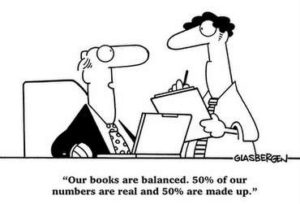Look at me! It’s only been a couple of weeks or a month since my last post! I’m on the ball!
Today I want to discuss poor bookkeeping. Whether you do it yourself or outsource, poor bookkeeping is absolutely detrimental to your business!
Consequences of Poor Bookkeeping
- Incorrect revenue reported. You don’t want to under report your revenue as this will get you in trouble with CRA. And you certainly don’t want to over report your revenue. Believe me, this can happen if the person doing the bookkeeping doesn’t know what they are doing! We have had clients where all the revenue was recorded twice! This has all kinds of consequences from over paying GST/HST to having huge corporate tax bills. You can’t afford that!
- Missed expenses. If all of your expenses aren’t being entered properly you are missing important tax deductions!
- Books not up to date. Books that are behind result in poor business decisions. You can’t possibly make good decisions if you don’t know your numbers to date. Then there’s the late remittances to the government. The CRA charges high penalties and interest and this is an unnecessary expense that your business doesn’t need.
- Disallowing of expenses. Proper bookkeeping means having all the required receipts and documentation. Not being able to produce these documents can cause the CRA to disallow the expense.
- Loss of revenue. If you don’t keep careful track of your inventory, this can result in cash flow problems and a loss of revenue. Both under stocking and over stocking have their own consequences.
- An unnecessarily stressful audit. Poor bookkeeping raises the chance of triggering an audit. And it won’t be pretty.
Signs of Poor Bookkeeping
- CRA interest and penalties. The only reason you would incur these costs is if your bookkeeping isn’t up to date.

- Old, outstanding items. Reports should only contain current items.
- Inability to answer questions. If you outsource your bookkeeping, your bookkeeper should be able to answer, with relative ease, any questions you have about your financial statements.
- Inconsistent treatment of similar transactions. Entering the same expense every month is common and if they are not entered the same way each month, including with the correct sales tax, this is a sign of someone who doesn’t have the knowledge to do the bookkeeping properly.
- Unexplained amounts on the financial statements. If there are line items that don’t make sense or have no logical explanation, this is a red flag.
- Bank accounts are not reconciled. One of the checklist items we use to determine when the month is closed is whether or not the bank accounts and credit card accounts are reconciled to date. Lack of reconciled bank accounts can cause a myriad of problems including incorrect financial statements.
Why Should You Care
- It’s no secret that many businesses fail within the first five years. Poor bookkeeping is cited as the number one cause of this.
- Lack of accurate, up to date financial statements lead to bad business decisions (see previous point).
- Costs. I have seen businesses pay either an accountant or a competent bookkeeper tens of thousand’s of dollars to correct mistakes. It simply isn’t worth it.
If you suspect your bookkeeping might be in poor shape, whether you do it yourself or outsource, you may want to consider a new, experienced and qualified bookkeeper. For information on what to look for in a qualified bookkeeper, click here.




